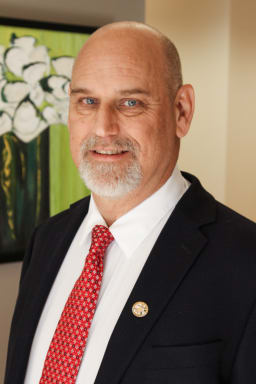
Former University of Virginia law school dean Paul G. Mahoney, the interim president of UVA, officially began the job August 11.
Will history record him as a stop-gap public servant or the university’s 10th president?
The U.S. Department of Justice asserts that practices related to diversity, equity, and inclusion at UVA and other universities are discriminatory and must end. And hundreds of millions in federal research dollars are at stake. As of July 30, the Trump administration had terminated $73.8 million in multi-year grants to UVA, the university reported.
Mahoney isn’t wasting the arguably manufactured crisis. He’s stepping up.
If he can keep UVA’s head down and the budget stable over the coming months, the interim president might stand a chance of going from temp to perm.
Mahoney and money
Mahoney, 66, is an unassuming securities law and corporate finance expert who has stood outside of the academic leadership spotlight for the past decade, having served as the School of Law’s dean from 2008 to 2016.
He earned his law degree from Yale University. He followed that up with clerkships under left-leaning Supreme Court Justice Thurgood Marshall and right-leaning Judge Ralph K. Winter Jr. of the U.S. Court of Appeals for the Second Circuit.
Mahoney also holds a B.S. in electrical engineering from the Massachusetts Institute of Technology.
Mahoney’s UVA legacy includes well-regarded financial stewardship of the law school in the midst of the global financial crisis and afterward—UVA was the only top-10 law school recognized for administrative efficiency in 2013 by U.S. News & World Report—and authoring the book Wasting a Crisis: Why Securities Regulation Fails.
Roger Kimmel, a 1971 UVA law graduate who served as chair of the Law School Foundation’s board of trustees, praised Mahoney in the spring 2016 UVA Lawyer alumni magazine: “He was always very prudent with the funds.”
But a case has been made that Mahoney isn’t just about money.
In that same article, UVA law faculty member George Geis, who served as vice dean under Mahoney, lauded his boss as “always willing to do the right thing—even under very challenging or stressful situations.”
So, what are his chances?
Mahoney, who is married to law professor Julia D. Mahoney, joined the UVA faculty in 1990.
That’s the same year 1993 UVA law graduate Harmeet Dhillon began her legal studies. She now leads the Justice Department’s siege against DEI as assistant attorney general for civil rights.
Dhillon is also a contributor to the Federalist Society, a conservative and libertarian legal organization that has a robust UVA chapter.
Several of Mahoney’s conservative UVA law connections installed him. Rachel W. Sheridan, UVA’s new rector, is a 1998 UVA law graduate who heads the presidential search committee. Porter Wilkinson is vice-rector and a 2007 UVA law graduate who serves as the search committee’s vice chair. (Wilkinson’s father is J. Harvie Wilkinson III, a Ronald Reagan appointee who has served as a United States circuit judge on the U.S. Court of Appeals for the Fourth Circuit since 1984.) And BOV member James H. “Jim” Donovan has been a UVA adjunct law professor since Mahoney’s deanship and is a Goldman Sachs senior executive with ties to the Trump White House.
How Mahoney handles their and others’ expectations will be one factor in his possible success.
Another could be if he leads UVA to enact policy changes that don’t harm federally protected classes of people or free speech.
Other tests might include whether Mahoney can gain consensus among faculty and staff, and whether he can appeal to the current generation of students, who have consistently shown a preference for DEI.
“I think my first goal is going to be to reach out to as many constituencies as possible to get their perspectives and concerns and ideas,” he recently told The New York Times.
The biggest factor deciding Mahoney’s future, though, might be how the Virginia governor’s race plays out in November. If Democratic candidate Abigail Spanberger wins, she could appoint new UVA board members, shifting the ideological configuration.
A less than ideal start
The board installed Mahoney following the apparent forced resignation of Jim Ryan, a 1992 UVA law graduate, in June. The Republican-aligned Board of Visitors elevated Mahoney on August 4 during a closed-door session that culminated a process criticized as rushed and poorly illuminated.
The United Campus Workers of Virginia, which includes UVA faculty among its members, alleged the BOV’s 10-day online nomination form and self-proclaimed “listening sessions” were “designed to pre-screen participation, silence dissent, and provide the appearance—not the reality—of democratic input,” the union’s faculty steering committee wrote.
But despite a recent UVA Faculty Senate “no confidence” vote in the current board, Mahoney expressed confidence following the announcement in the legitimacy of his installation.
During his subsequent first day on the job, Mahoney penned a letter to the UVA community in which said he had been preparing to teach the fall semester when “[t]his time last week” the board contacted him about the role. “If my experience can help the University, it will be a pleasure and an honor as well as a duty to serve,” he wrote.




